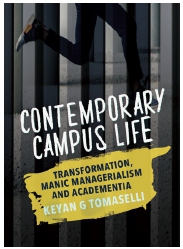Servicios Personalizados
Articulo
Indicadores
Links relacionados
-
 Citado por Google
Citado por Google -
 Similares en Google
Similares en Google
Compartir
South African Journal of Science
versión On-line ISSN 1996-7489
versión impresa ISSN 0038-2353
S. Afr. j. sci. vol.118 no.1-2 Pretoria ene./feb. 2022
http://dx.doi.org/10.17159/sajs.2022/12529
BOOK REVIEW
The tail wagging the dog: Tomaselli's Contemporary Campus Life and why we are overdue for introspection as academics
Elnerine W.J. Greeff
Business School, University of Derby, Derby, United Kingdom Email: E.Greeff@derby.ac.uk
BOOK TITLE: Contemporary campus life: Transformation, manic managerialism and academentia
AUTHOR: Keyan G. Tomaselli
ISBN: 9781928246268 (softcover, 252 pp, ZAR350)
PUBLISHER: Best Red, Cape Town, South Africa
PUBLISHED: 2021

Students of higher education often experience their first scholarly epiphany when they engage with ideas of communism, post-modernism or those ever-present philosophical logic exercises that are rife in the first years of postsecondary education, almost irrespective of one's course or place of study. Interesting as they are, my first moment of scholarly enlightenment was as a direct result of institutional theory. As a strategic communication academic, I am still a staunch believer in the power of institutional theory showing us what not to do, by helping us understand why we are doing what we are doing, within organisational settings. If you have a sense of humour while reading these theories, they have the ability to lay bare the absurdities of the bureaucratic and the inherent ridiculousness of scalable systems of productivity.
Tomaselli's Contemporary Campus Life: Transformation, Manic Managerialism and Academentia brings all of this vividly to life by conceptualising life and lived reality in the managerial university. It exposes how, on the ruins of the ivory tower, universities managed to build 'instrumentalist structures created by often alienating regulation and governance'. The narrative, which progresses through eleven essays, asks 'whatever happened to the publics who inhabit these symbolic, shambolic and corporeal structures' while showing how the 'public spheres that once offered agency and social imagination are fast waning'. Not being able to help yourself nodding along as you read, the book brings an awareness of how little in these structures are 'elegantly simple anymore. Policymakers always devise the most complicated solutions to address simple problems'. In this way, Tomaselli succeeds in revealing those absurdities that have academics running around in a rat race - aware but disenfranchised by the 'People of Worth' that dictate academic pursuits and endeavours.
In Contemporary Campus Life, Tomaselli masters the use of the weapons of the satirist - wit, sarcasm, and irony -to frame current debates 'regarding (i) the academy; (ii) the educational crisis facing South Africa; and (iii) threats to tertiary education across the world'. He does so by offering applications of the concepts of some theorists - including Martin1, Levitt and Dubner2 and Harford3 - but mostly through the keen eye that could only be honed through decades in academia, and a sense of humour to survive it. Tomaselli makes his stance clear:
My narrative defamiliarizes what is taken for granted and identifies what needs to be changed for the better. Theory is not just impenetrable sentences written in a textbook, learned off by heart and the jargonised by students in exams. Rather, theory manifests in practice. Theory is explanatory and the chapters in this book connect the dots with nitty-gritty everyday illustrations from the academic experience.
Satire, as used in this book, should not, however, be mistaken for superficiality. This approach might keep the form of the book light, but it challenges readers not to take its content lightly. Through this satire, we are asked about our own complicity in the state of academia - whether we are laughing at, with, about, or in spite of our own involvement in it. After all, as my reading into institutional theory has taught me, institutions are reflections of ourselves. Contemporary Campus Life asks for introspection and for us to confront the ways in which we allowed our 'self-imposed extermination' as academics and scholars; how we 'permitted our entrapment in bureaucratic structures with no soul'. Further, in unapologetic terms, the book asks about the students we are producing -products of this campus life.
Therefore, in an utterly readable style, the book raises uncomfortable but necessary topics unflinchingly, but not coldly. If a good library has something in it to offend anybody, then every library should include this book. It certainly should be compulsory reading for managers or would-be committee chairs in any academic setting because it shows how the tail is wagging the dog as academic managerialism increasingly takes root.
Through a storytelling style best characterised by that of a griot, Tomaselli confronts all academics, managers, and society at large with the idea of academentia - a term he coined in 2008. In the way that it is applied in this book, this concept is not just framed as critique, but as a call to action, a confrontation with the self, and a challenge to (self)engagement. The author clearly shows us his unique and perceptive position as culture studies and autoethnography scholar, as he articulates circumstances that he has come to know as an insider with the clarity and critical eye that one would expect from an outsider. As the book concludes, it is made clear that:
While there is no magic bullet available in the struggle against blundering bureaucracy, understanding is the best means of navigating the terrain, and doing the best we can under the conditions in which we find ourselves. While academentia exists, the condition can be navigated, reigned in and critically examined. And making sense of it, appropriating it constructively and sometimes taming it can even be fun.
References
1. Martin TL. Malice in blunderland. New York: McGraw Hill; 1973. [ Links ]
2. Levitt SD, Dubner SJ. Freakonomics: A rogue economist explores the hidden side of everything. London: Penguin; 2006. [ Links ]
3. Harford T. The undercover economist. Oxford: Oxford University Press; 2006. [ Links ]
PUBLISHED: 27 January 2022














